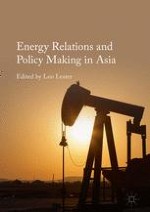2016 | OriginalPaper | Buchkapitel
10. Evaluating the Impact of Oil Exports from GCC Countries on China’s Oil Security
verfasst von : Qiang Ji, Ying Fan
Erschienen in: Energy Relations and Policy Making in Asia
Verlag: Springer Singapore
Aktivieren Sie unsere intelligente Suche, um passende Fachinhalte oder Patente zu finden.
Wählen Sie Textabschnitte aus um mit Künstlicher Intelligenz passenden Patente zu finden. powered by
Markieren Sie Textabschnitte, um KI-gestützt weitere passende Inhalte zu finden. powered by
